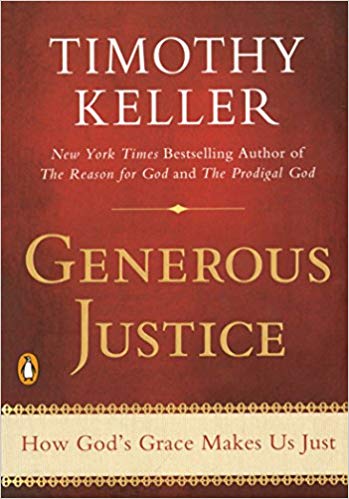In the introduction to Generous Justice: How God's Grace Makes Us Just, Tim Keller responds to three questions: 1) Why write this book?; 2) Who is this book for?; and 3) Why am I interested in justice? Keller says writing the book was critical because “less well known is the Biblical teaching that true experience of the grace of Jesus Christ inevitably motivates a man or woman to seek justice in the world” (p. xiii). He also explains why he was personally motivated to write the book. His own life was lacking in the pursuit of justice, and the more he studied the Scriptures and gained proximity to minorities, the more he understood that God’s people must do justice in the world.
Generous Justice consists of eight chapters and two main sections. Chapters one through four lay out a theology of justice while the chapters five through eight focus on practices. It’s a great introduction to the relationship between salvation by faith through grace and its social implications in the Christians life. In explaining Jesus’ parable of the Good Samaritan, for example, Keller writes, “What does it mean to love your neighbor? . . . By depicting a Samaritan helping a Jew, Jesus could not have found a more forceful way to say that anyone at all in need—regardless of race, politics, class, and religion—is your neighbor.” (p. 67) I consider it a must-read because it is biblically rich, practical, and seems to speak from an objective political lens.
Justice grounded in the Word
Keller approaches each topic from a biblical worldview. He argues that justice begins to take place as a result of the right relationship with God and a heart-posture of generosity. As he expounds on texts in both the Old and New Testaments, it becomes clear for the reader that God’s concern for his people doing justice is a main theme throughout the Bible. For example, in chapter two, Keller digs into Deuteronomy 15:1-8 to show how God expected Israel to deal with the poor among them. If Israel had followed God’s direction with all their hearts, the existence of long-term poverty in their land would have ceased.
Practical applications
Because Keller makes the terms, ideas, and biblical truths around justice accessible, Generous Justice is highly practical. For example, in chapter seven, he discusses what justice looks like in the public square, explaining how there is significant division within academia around the definition of “justice.” Keller argues that justice is inherently judgmental and religious in nature. Therefore, to take a stand on what justice means inherently forces value judgments, which is the greatest sin in academia and our current American culture. For the Christian, to understand that justice inherently contains value judgments that are religious in nature should create a boldness when discussing the issue.
Another example is in chapter five, when Keller says we do justice because it reflects God’s character, everything we have is ultimately God’s, and doing justice is a response to the grace of God poured out on sinners. In his conclusion to these points Keller shares,“The world makes social class into bottom-line identities. You are your social status and bank account—that is the basis for your self-regard.” (p. 104) But this is not true for the Christian. Our identity is in Christ, and everything we do is a response to his grace.
Politically objective
Finally, Generous Justice takes an objective political lens. This is especially evident in chapter one when Keller explains why he embraces the term “social justice.” “When these two words, tzaedqah (righteousness with social implications) and mishpat (justice in Hebrew), are tied together, the English expression that best conveys the meaning is ‘social justice.’” (p. 14)
Keller then argues that a robust, biblical view of justice doesn’t fit neatly into either party in our two-party system in America. He goes so far as to say, “In the end what the Bible says about social justice cannot be tied to any one political system or economic policy. If it is possible, we need to take politics out of this equation as we look deeper into the Bible’s call for justice” (p. 32). Keller concludes with a warning, “And if we tie the Bible too tightly to any particular economic system or set of public policies, it bestows divine authority on the system” (p. 164).
The main weakness of Generous Justice is chapter three. Where every other chapter thoroughly exposits the context, significance, and meaning of the text, this chapter is lacking. Scriptures are primarily relegated to parenthetical references. More robust examples from the gospels would show how Christ perfectly demonstrated justice in his earthly ministry.
Despite that, I think every Christian should read Generous Justice as an introduction to social justice and the Christian’s role in it. With a pastor’s heart and balanced approach, Keller speaks uniquely with authority, biblical fidelity, and cultural awareness on the issue. In a day and age where American Christianity has become overly individualistic and highly consumeristic, Generous Justice is an exceptional resource that turns the Christian’s gaze away from the self and toward others so that we can, as Keller writes, seek the “shalom” of our environments.









